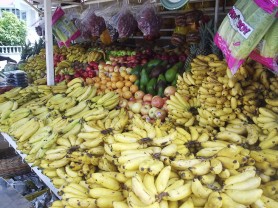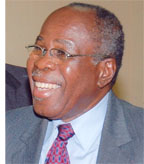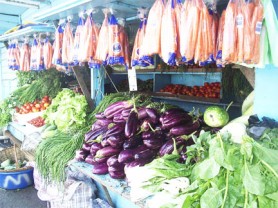Four years later harmonization of policies seen as major hindrance
Regional harmonization of policies is hampering the progress of the Jagdeo Initiative, which is moving slowly and more needs to be done to hasten the process, officials say.
 Four years after the launch of the Initiative, which was designed to advance the regional transformation of agriculture, ensure the region is food-secure and make the sector competitive, the goals are still to be realized. Though work is ongoing in the various states of the Caribbean Community (Caricom), the region’s food import bill is still over US$3 billion annually.
Four years after the launch of the Initiative, which was designed to advance the regional transformation of agriculture, ensure the region is food-secure and make the sector competitive, the goals are still to be realized. Though work is ongoing in the various states of the Caribbean Community (Caricom), the region’s food import bill is still over US$3 billion annually.
“Our level of productivity has not gone anywhere near to meeting the needs of the population and where there is increased production, the cost is not commensurate and competitive to those of the imported products so people find an opportunity for importing to the region”, Sam Lawrence, Adviser to the Regional Transformation Programme (RTP) for Agriculture in the Caricom Secretariat told Stabroek News.

In an interview recently, he said that actions taken at the national level rather that the regional level, funding, and human resources are the reasons for the slow progress of the Initiative. Lawrence said that he is “totally unhappy” at the pace with which the Jagdeo Initiative has progressed commenting that there is a general feel of a lack of commitment to the sector. Guyana’s Agriculture Minister Robert Persaud told Stabroek News in a separate interview that there is always room for more action. “In some areas there could be much more progress and we do hope that the Caricom machinery and others involved will look at ways in which we can expedite or see much more results within the context of the Jagdeo Initiative”, he said.
Persaud declared that it is now a matter of getting results and Guyana has been able to make progress but similar advancement is not seen region-wide. He observed that Guyana is food-secure while the region is not. But he noted, countries are taking initiatives to deal with their food security situation despite the continuing huge food import bill. “And so while the numbers… the growth amount may not reveal these efforts I think over time and with Guyana’s sustained drive and if we have the type of collaboration and the type of active implementation, I think over time, we’ll be able to dent that number. Guyana is looking for a big share of that number sometime in the future”, he commented.

Country-specific interventions are occurring, Lawrence concurred. He suggested that sovereignty is an issue stating that while actions need to be taken at a national level, they should be harmonized region-wide. “It has to be harmonized if we are going to abide by the whole idea of having a single economic space, a single market. So while we recognize that there is national sovereignty there is need for harmonization to get the common benefit”, he insisted. He stated that national priority seems to take pre-eminence over anything else and consequently while one issue moves quickly in one country, it moves slowly in another.
How much of an impact the Jagdeo Impact has had thus far is still to be gauged and the Caricom Secretariat is undertaking a country-by-country evaluation of activities. Lawrence asserted that most people would be surprised at the amount of work that is being done in advancing the process of removing the constraints at the national level. “I agree that it is not as aggressive and not advancing at the pace that we would like it to be but I think that actions are being taken. So we don’t want anybody to feel that nothing has been happening,” he stressed.

Five years ago, in July 2004 at the Caricom Heads of Government conference in Grande Anse, Grenada, Guyana’s President Bharrat Jagdeo presented a paper entitled ‘A framework for the Repositioning of Caribbean Agriculture’. In the Framework, he stressed the need for a regional policy and strategy for strengthening food security and alleviating poverty.
In January 2005, the Guyanese President’s proposal was formally dubbed the ‘Jagdeo Initiative’ with a theme ‘Strengthening Agriculture for Sustainable Development’. It was described as a practical instrument to move forward the RTP on Agriculture or its successor, the Caricom Common Agricultural Policy.
But even before then, in 2002, Jagdeo, who is the Lead Caricom Head of Government for Agriculture, had sought the assistance of the Food and Agriculture Organisation (FAO) and Inter-American Institute for Cooperation on Agriculture (IICA). In late 2003, he proposed that the region build on its past effort to develop a Common Agricultural Policy and requested the Directors General of IICA and the FAO to support the Caricom Secretariat in developing a framework for repositioning agriculture in the region.
Following wider consultations, the first proposal outlining the Initiative’s vision, scope and focus and the process for its development was presented by President Jagdeo to the Grande Anse Conference and the Heads of Government endorsed it.
Declining role
The declining role of agriculture in the Region, the continuing loss of preferential markets for the Region’s traditional products and the rapidly increasing extra-regional food import bill are among the serious and challenging issues highlighted in the Initiative.
Ten constraints to the success of the Jagdeo Initiative were also identified including limited financing and inadequate new investment in agriculture. Others are outdated and insufficient agricultural health and food safety systems; inadequate research and development capacities. A fragmented and disorganized private sector; inefficient land and water-distribution and management systems; deficient and uncoordinated risk management measures; inadequate transportation systems, weak and non-integrated information and intelligence systems also characterize the sector.
In terms of marketing, weak linkages and participation of producers in growth market segments; and lack of skilled and quality human resources were also identified. The constraints have since been revised and two merged, reducing the constraints to nine. The necessary interventions were also outlined and countries and agencies were assigned to lead the process of developing and implementing these.
There was no money
But before any of this could be done, an overarching constraint had to be tackled. There was no money. It was decided that there was a need to set up a special fund, the Agricultural Modernisation Fund, to see how resources could be raised. However, the Regional Development Fund – now established, was given precedence and the design work to put an agricultural “window” into the RDF has started, Lawrence disclosed. Work is slated to be done by October.
Since then, in June 2007 an Agriculture Donors Conference was held in Trinidad and 15 donors were identified. At the Conference, four donors inclusive of the Italian and Spanish Governments, the FAO and the European Union put US$11.6M on the table. That conference was designed to satisfy the public sector needs for investment in the sector, Lawrence said. Over 65 regional and national projects amounting to US$439M were laid out and discussions with the 15 donors are ongoing.
A year later, in June last year, the Agriculture Investment Forum was held in Georgetown, with the idea of mobilizing resources for the private sector. Twenty-five projects were submitted from the region with a request for over US$50M. Of those, 18 are still being actively pursued with six having successfully negotiated and receiving some resources for start-up of their projects.
More recently, in late May, a Public-Private Sector Consultation on Agri-Business was held in Georgetown where participants called for the establishment of a council that will advance regional public-private co-operation in the agriculture sector.
However, while some work has been done in addressing the other constraints, Lawrence acknowledged that it has been slow and there are even serious problems in areas such as research and development. He pointed out though that most member states have put additional funding arrangements in place for the agricultural sector and are trying to make these as concessionary as possible. Countries have also been working on a marketing system, he said.
Moreover, Caricom Secretary-General Edwin Carrington recently told reporters at a media clinic that the sector is preparing for some specific activities “on the ground” following several initiatives and interventions.
But, Persaud pointed out that there is always room for more action and a need to keep the focus on agriculture. At the end of the day, he stated, it is left to the region to look at the issues, the remedies and take the necessary steps. The issues are complex, he noted, and require regional support. The region is yearning for more results, he added.
Meantime, in Guyana’s case, Persaud said that the country has been aggressive in seeking to get the private sector interested in the region in general and Guyana in particular. He noted that Guyana has offered to work with regional states to create partnerships to offer some of the solutions and deal with some of the limitations.
“We’ve always made it clear that we are ready to be the food production base of the region. We may not have the competitive advantage in processing and in packaging but while we are developing that capacity, we can create linkages with Trinidad and with other countries that have access to cheaper energy or different flows of technology…or countries that have the investment dollars (to come in) and sink some investments in our agriculture sector”, he said.
The Guyanese Agriculture Minister pointed out that Guyana has sought to work through private-public partnership arrangement, tried a number of agro-investment seminars and even communicated directly with companies and individuals to see if they are interested. He said that arrangements have been put in place through the Guyana Office for Investment to make the process easier and the Agriculture Ministry can even get involved in moving the process forward.
What was the response like? “I still think that the response could be a bit more enthusiastic from the Caribbean region”, Persaud asserted. He stated he was not sure why this was so but noted that that the agriculture sector is very important. “There has been progress but possibly there need to be a bit more urgency in terms of people giving priority focus to investments within the agri-sector”, he observed. Lawrence agreed that the response to Guyana overtures could be a bit warmer but noted that “there are also some conditions that probably lends itself to the coldness of the region…there are certain local conditions that probably add to or enhance the coldness”, he commented.
After the Agri-Investment forum, Persaud said, there was a “plethora of interest” though less than a dozen persons submitted proposals and work is ongoing. Some have started with many looking at exporting. Others are looking at packaging and others, “grander projects”, which would take longer to realize.
Additionally, in August 2007, Guyana had made proposals to the government of Trinidad and Tobago for cooperation on agriculture that would see that island nation providing funding for farms in this country. “That proposal was made and we have not as yet received a definitive word from the Trinidadian Government in that regard so that proposal is still there but in the meantime we are pursuing the private sector, talking to people in Trinidad themselves, about them getting involved and several of them have indicated interest in this regard”, Persaud disclosed. He revealed that some follow-up work was done but this is where it stands and he hopes that it will bear fruit some time in the future. Trinidad has since moved to establish several mega-farms in that country, including one by a Guyanese entrepreneur.
Persaud said further that he had discussions with the Trinidadian Minister of Agriculture and some progress has been achieved in overcoming some of the hurdles, especially as it relates to Guyanese agricultural produce accessing the Trinidadian market. “There’s some active discussions taking place, there’s a protocol that is about to be finalized. And we do hope that once these things are clear, it may give investors from Trinidad much more confidence in getting directly involved in Guyana’s agricultural sector”, he said. The issues being discussed include sanitary and phyto-sanitary measures and the various export requirements.
Imported processed food
Meantime, a visit to major supermarkets in the region, including in Guyana, will reveal a surfeit of imported processed food on the shelves. Even some that are processed within the region use imported raw materials, Lawrence pointed out. He said that the processors say that if they do not import, they would not have a reliable supply to satisfy their market. “And therefore the need does exist for us to go on an aggressive development programme to start to grow more of those raw materials that are used in the agro- processing”, he declared.
The Agriculture Official noted that he does not see this changing in the near future because those crops have an “incubation period” and once the proper research and use of technology is done, it could be a minimum of two and a half to five years, before full production capacity is achieved.
On the future of the Jagdeo Initiative, Lawrence, noting that is just a part of the “complete agricultural remedy”, said that it came out because there was no actual planning taking place on agriculture. He said an add-on to the Initiative is an agriculture strategic plan for member states out of which a regional strategic plan for agriculture will be developed. By next year, this plan will be fully ready for implementation, he assured. Further, he said, there is also an Agro-Business Enterprise Development Programme, which is funded and which will develop the enterprise aspect of agriculture and create opportunities for young people to enter the sector as an enterprise. The programme will examine the various economies of scale that would make a project viable. He said that the two projects would complement to a great extent, the Jagdeo Initiative.
Persaud, meanwhile, declared that the Jagdeo Initiative will remain relevant in the foreseeable future though it requires sustained attention and action. He said that the Caricom Heads of Government Conference in Georgetown would give a necessary impetus to the implementation of the Initiative. Consumers too, have a role to play, he declared and the need for the region to support the region’s agriculture is very critical.
According to Lawrence, any push for the Initiative must come out of a deeper commitment from all member states towards agricultural development. He said that member states must be able to tie agriculture to the other aspects of their economy. In this light, he pointed out that those states that are highly dependent on tourism must have as part of their agricultural programme, the capacity to feed the tourists. If they can’t, then they must look to where else in the region can provide the food to supplement what they produce themselves, he said. He stressed that with all the lack of financial and human resources, infrastructure, among the other constraints, if there is commitment, the wherewithal can be created.





